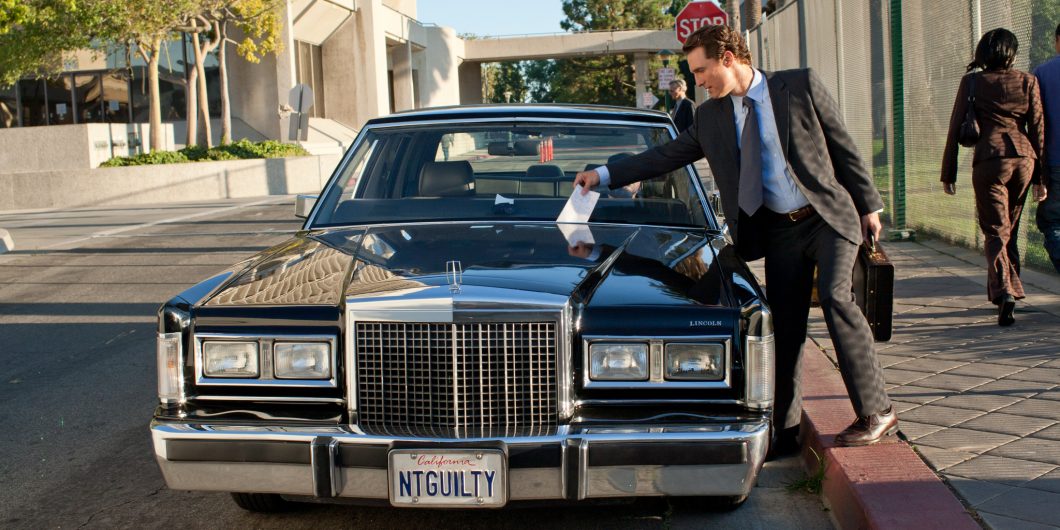How the Law Both Fails and Redeems Us
Michael Connelly has emerged as the most successful L.A. crime writer in the period when that city became more important to American pop culture than New York. Connelly’s Bosch detective series has a new season out at Amazon and his criminal defense series, The Lincoln Lawyer, has debuted on Netflix. He made his debut with a Harry Bosch novel in 1992 (The Black Echo); he has written at least one novel every year since. All told, there are 24 Bosch and 6 Lincoln Lawyer novels. The two protagonists—half-brothers—meet frequently, so fans of the characters have more than enough stories even before they get to the shows.
Of the two series, The Lincoln Lawyer is the more sophisticated, because it shows how important legal procedures have become to American life. They have ended up forming an endlessly complicated web in which everyone is caught, without giving people much confidence that the laws are just, that they are effectively enforced, or that conflicts are impartially adjudicated. Mickey Haller—known as the Lincoln Lawyer because he works out of his 1963 Lincoln Continental—specializes in criminal defense. He proves talented at dealing with both the wealthy elite and the criminal underclass. His perspective shows you how much is rotten in Los Angeles—and if California is the American paradise, the show raises serious doubts about how much progress we’ve really achieved.
Connelly’s great achievement is dramatizing the problem of the city in American life. It only takes reading the headlines to realize we really don’t know how to administer cities or how to deal with their politics. We cannot comprehend how to mix the incredible wealth and hierarchical complexity of city life with the American beliefs in freedom and equality. The Lincoln Lawyer novels suggest people are essentially private. They do not really understand themselves as citizens participating in the public life of America. Politics is largely the private endeavor of some successful people, essentially an oligarchy. American suspicion of abusive institutional elites is the driving force in these often-ingenious courtroom thrillers, yet justice gets done through Haller’s consummate skill and considerable daring.
Preventing Miscarriages of Justice
The first Mickey Haller novel was adapted competently as The Lincoln Lawyer, a 2011 film starring Matthew McConaughey. The new Netflix series bears the same name, but it’s an adaptation of the second novel, The Brass Verdict. Thanks to competing commercial rights, Harry Bosch—and therefore their relationship—is out of the story. Conforming to woke pieties, they transformed Haller’s driver, a surfer called Patrick, into a black lesbian woman who also works as backup dancer for celebrities.
Aside from this point, the series succeeds, because it sticks fairly closely to the Connelly formula. Of course, it’s implausible that criminal cases would really come down to some astonishingly clever discovery of a fact, a weakness in the plot of a criminal mastermind, so to speak. Yet these surprises make for entertaining TV and reveal some of the contradictions of American life. After all, in Lincoln Lawyer and Brass Verdict, Haller has to defend both rich and poor, the innocent and guilty, celebrities and nobodies. He exposes criminal connections across the immense gulfs in American society. Throughout, we see the drama of freedom divorced from law, leading to the fearful prospect of bureaucracy and institutional authority resolving this confused situation by creating an order so implacable and inhuman that it too becomes lawless.
At the beginning of the series, Haller is recovering from a surfing accident which also led him to take painkillers until he lost his willpower and his career. His failures and weaknesses weigh on him—he was also shocked by seeing a client he believes innocent sent to jail. He has recovered and wants to be a lawyer again, not least to try to save that man. Then, suddenly, he inherits the entire caseload of a successful defense lawyer who was murdered. Now we have a story, indeed, a mystery.
He has to quickly learn about a number of cases and their upcoming trials, about their various connections and the way they make sense of the career of the murdered lawyer. Meanwhile, he also has to defend himself—after all, the murderer might come for him next. The season is all about doing justice in a hurry, saving people from a careless system, and preventing corrupt authorities from dooming the vulnerable.
It’s refreshingly free of the nonsense found in most TV series. Here, we have strong clues about good and evil to help us judge events. This sets up drama, urgency, and a number of twists in the story, but also a contrast between the two lawyers. They represent the past and a possible future. This contrast shows us two ways of thinking about criminal defense, leading to a remarkably uplifting conclusion, giving America hope, mostly by giving people second chances.
This is the paradox of the story: It wants to restore American faith in the justice system by bravely defending the vulnerable and thus affirming democratic freedom. But it dissociates the demand for justice from obedience to the laws, thus destroying the ground of democracy as a common agreement about how to live our lives.
Haller is familiar with many of the dark arts of evasion and deception, the myriad lies people tell to secure their safety or interests, so he knows how to practice them as well. He acts not for his private advantage, but for the sake of restoring justice. And, more urgently, he prevents miscarriages of justice, lest people lose faith in America, which would reduce authority to mere violence. The belief in justice is tested in every trial and must be vindicated. Given the authority of the government, even misfeasance or an innocent mistake, not just malfeasance, can destroy people and endanger the public support on which the tranquility of American life depends.
Why are courts so important in our lives that we have such strong feelings about works of fiction? Partly, it’s our decadence! We are too litigious, too bureaucratic and regulated, and any big city is in important ways unjust. In all these ways, we learn to fear what others might do to us with the use of the laws, whether private citizens or officials. We are not able to say with confidence that our way of life isn’t open to accusations of criminality, leading us to feel like creatures of circumstance, helpless and hopeless. Legal problems arise unpredictably and implacably, so we develop a sophisticated new vocabulary out of fear—from lawfare, using the laws as a weapon of war in domestic politics, to “the process is the punishment.” We have little freedom left and routinely consult the inscrutable will of officials before we act. Partly, it’s because we prefer a private life, away from politics and political decisions. Most of us don’t even know a politician; and we encounter the judiciary power of government far more often than we’re prepared for. If its rules are arcane and lawyers are costly, simply the difference between ordinary life and a court of law makes it seem illegitimate in a democracy. After all, the judiciary power is largely removed from voting, competitive elections, and the popularity that involves.
The Problem of Redemption
The Lincoln Lawyer looks at our decadence and our reluctance to do anything about it in the specific light of criminal defense, so the question often is whether the way Americans think about freedom is compatible with law. The potential miscarriages of justice he prevents are sometimes the result of bureaucracy. The indifference of authority, moreover, is also an opportunity for corruption. Thus we get to a deeper problem: Someone has to be blamed for scandalous crimes, but it’s not particularly important who gets the blame, so long as the explanation is plausible and legal procedures are satisfied. Since officials do not answer to ordinary Americans, they can tolerate injustice in their own ranks. In the background, we see the unstoppable political corruption of L.A., hopeless of reform.
Haller goes through the series trying to live up to his father’s fame as a criminal defense attorney, delivering the weak from the cruelties of a justice system that’s more machine than human. He wants to achieve a reputation that would reassure him about the importance of justice to ordinary Americans. This populist turn of his thought makes him see only one problem in the criminal justice system: It’s cruel, or at least indifferent. He repeats the mantra of unreflective liberalism: “Better that a thousand guilty men go free than one innocent man suffer.”
Taken seriously, this would mean an end to punishment, and the end of all government and all politics, not least by encouraging criminals to commit outrages and inducing despair in their victims! The statement’s popularity in England and America goes back centuries, when a much harsher justice system required tempering by clemency, and the identification of the lawful with the just was taken for granted. Haller wants more than to be a lawyer, he seems to want to absolve the guilty. It’s no coincidence that the name of the innocent man he seeks to free is Jesus.
This theological undertone to the story unfortunately is undeveloped. There’s one mention of being brought up in church, but that’s it. Practically, we end up with the suggestion that, since the city doesn’t really offer justice, because the rich are not equal under law to the poor, there’s no excuse for punishing anyone. Of course, Haller is himself no stranger to lying to authorities or breaking the law. This is the paradox of the story: It wants to restore American faith in the justice system by bravely defending the vulnerable and thus affirming democratic freedom. But it dissociates the demand for justice from obedience to the laws, thus destroying the ground of democracy as a common agreement about how to live our lives. Haller give us an idealism so deeply mixed with cynicism that one cannot say easily whether the point of getting second chances is to improve oneself or to prepare excuses for further failures.
Viewers must wait until Season 2 for a dramatization of the twin problems of this victorious idealism. On the one hand, what assurance is there that being spared punishment, people will improve? How can our protagonist choose the worthy, and if their crimes issue from their circumstances, how can he change those circumstances? On the other hand, if the major problem he deals with is corrupt authorities, how can the necessary faith in the justice system even be maintained among either elites or ordinary people? Ultimately, he attempts reform or revolution and we will have to see which and how successfully.


